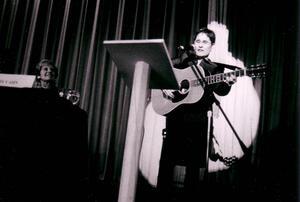Debbie Friedman
It was kol isha (the voice of women) for col isha (every woman) that inspired me to write inclusive music. It is beneficial not only for women, but for men and children as well. Singing helps us learn how to be vocal. Ultimately, the voices of women, their sense of empowerment, can be borne from song, which can form the core of political, spiritual, and economic transformation. The more our voices are heard in song, the more we become our lyrics, our prayers, and our convictions. Then every woman will be heard, and every voice will be heard: kol isha for col isha.
Debbie Friedman was a singer, songwriter, and guitarist, who recorded more than 20 albums. Friedman’s music is living Judaism, teaching children and adults to love prayers that might otherwise have remained strings of foreign words, unrelated to their lives. Her music is so fully integrated into synagogue liturgy that in many congregations it is considered “traditional.” Friedman performed in hundreds of cities in the United States, Canada, Europe, and Israel and received numerous awards and honors. She served as cantorial soloist at the New Reform Congregation in Los Angeles, California, and directed the music component of the intensive Hebrew Chalutzim program at Olin-Sang-Ruby Union Institute in Oconomowoc, Wisconsin, where she continued to co-lead Hava Nashira, the annual song-leading and music workshop she created until her death. Friedman served on the faculty of many institutions and colleges. In 2007, Friedman accepted an appointment to the faculty of Hebrew Union College-Jewish Institute of Religion's School of Sacred Music in New York where she instructed both rabbinic and cantorial students. She also taught workshops, directed a 300-person chorale, and performed in concert. Debbie Friedman died on January 9, 2011.



